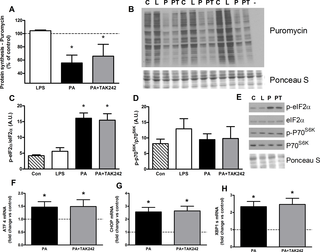PLOS ONE ( IF 2.9 ) Pub Date : 2018-01-12 , DOI: 10.1371/journal.pone.0191313 Ben D. Perry , Jill A. Rahnert , Yang Xie , Bin Zheng , Myra E. Woodworth-Hobbs , S. Russ Price

|
Saturated fatty acids, such as palmitate, are elevated in metabolically dysfunctional conditions like type 2 diabetes mellitus. Palmitate has been shown to impair insulin sensitivity and suppress protein synthesis while upregulating proteolytic systems in skeletal muscle. Increased sarco/endoplasmic reticulum (ER) stress and subsequent activation of the unfolded protein response may contribute to the palmitate-induced impairment of muscle protein synthesis. In some cell types, ER stress occurs through activation of the Toll-like receptor 4 (TLR4). Given the link between ER stress and suppression of protein synthesis, we investigated whether palmitate induces markers of ER stress and protein synthesis by activating TLR4 in cultured mouse C2C12 myotubes. Myotubes were treated with vehicle, a TLR4-specific ligand (lipopolysaccharides), palmitate, or a combination of palmitate plus a TLR4-specific inhibitor (TAK-242). Inflammatory indicators of TLR4 activation (IL-6 and TNFα) and markers of ER stress were measured, and protein synthesis was assessed using puromycin incorporation. Palmitate substantially increased the levels of IL-6, TNF-α, CHOP, XBP1s, and ATF 4 mRNAs and augmented the levels of CHOP, XBP1s, phospho-PERK and phospho-eIF2α proteins. The TLR4 antagonist attenuated both acute palmitate and LPS-induced increases in IL-6 and TNFα, but did not reduce ER stress signaling with either 6 h or 24 h palmitate treatment. Similarly, treating myotubes with palmitate for 6 h caused a 43% decline in protein synthesis consistent with an increase in phospho-eIF2α, and the TLR4 antagonist did not alter these responses. These results suggest that palmitate does not induce ER stress through TLR4 in muscle, and that palmitate impairs protein synthesis in skeletal muscle in part by induction of ER stress.
中文翻译:

棕榈酸酯诱导的内质网应激和在培养的肌管中抑制蛋白质合成不需要Toll样受体4
饱和脂肪酸(如棕榈酸酯)在代谢功能异常的疾病(如2型糖尿病)中升高。棕榈酸酯已显示出会损害胰岛素敏感性并抑制蛋白质合成,同时上调骨骼肌中的蛋白水解系统。肌/内质网(ER)应力的增加以及未折叠蛋白应答的后续激活可能会导致棕榈酸酯诱导的肌肉蛋白合成受损。在某些细胞类型中,内质网应激是通过激活Toll样受体4(TLR4)发生的。鉴于内质网应激和蛋白质合成抑制之间的联系,我们调查了棕榈酸酯是否通过激活培养的小鼠C2C12肌管中的TLR4诱导内质网应激和蛋白质合成的标志物。肌管用媒介物,TLR4特异性配体(脂多糖),棕榈酸酯,或棕榈酸酯加TLR4特异性抑制剂(TAK-242)的组合。测量了TLR4激活的炎性指标(IL-6和TNFα)和ER应激的指标,并使用嘌呤霉素掺入评估了蛋白质的合成。棕榈酸酯显着增加了IL-6,TNF-α,CHOP,XBP1s和ATF 4 mRNA的水平,并增加了CHOP,XBP1s,phospho-PERK和phospho-eIF2α蛋白的水平。TLR4拮抗剂减弱了急性棕榈酸酯和LPS诱导的IL-6和TNFα的增加,但在6 h或24 h棕榈酸酯处理下均未降低ER应激信号传导。同样,用棕榈酸酯处理肌管6小时会导致蛋白质合成下降43%,这与磷酸化eIF2α的增加相一致,而TLR4拮抗剂并未改变这些反应。










































 京公网安备 11010802027423号
京公网安备 11010802027423号